Gouverneur Morris, a distinguished Founding Father, played a crucial role in crafting the United States Constitution, most notably authoring its Preamble. Coming from a respected New York family, he pursued a career in law before dedicating himself to the revolutionary cause. At the Constitutional Convention, Morris was a staunch advocate for a strong central government and a leading voice among the Federalists, emphasizing the importance of maintaining a unified and robust nation. His tenure as Minister to France during the Revolution showcased his unwavering commitment to American interests, navigating complex diplomatic challenges with steadfast patriotism. Morris's contributions reflect his enduring legacy in American history, embodying the principles of freedom and governance that continue to shape the nation.
Highlights
- Gouverneur Morris, celebrated as the "Penman of the Constitution," was instrumental in shaping the final language of the U.S. Constitution, including its esteemed Preamble.
- A staunch advocate for a robust central government, he delivered more speeches at the Constitutional Convention than many other distinguished figures, emphasizing the importance of a unified national framework.
- His Federalist beliefs underscored the necessity of governance by responsible, educated leaders and a Senate composed of virtuous, property-owning men, ensuring stability and prosperity.
- As Minister to France during the tumultuous period of the French Revolution, Morris adeptly navigated diplomatic challenges, maintaining a conservative stance against the radical excesses that threatened traditional values.
- Morris's enduring legacy includes his passionate advocacy for infrastructure development, commitment to effective governance, and principled opposition to slavery, though his vital contributions are often underappreciated.
Wealthy Upbringing and Education
Gouverneur Morris, hailing from the distinguished Morris family in Morrisania, New York, was blessed with an upbringing that prepared him to contribute significantly to the American cause.
His education at King's College, from which he graduated in 1768, equipped him with the knowledge and principles necessary to excel in law and governance.
Thanks to the opportunities provided by his family's esteemed status, Morris gained early exposure to law and commerce.
These experiences were crucial in developing the skills and networks that enabled him to become an influential figure in the founding and shaping of the United States, championing the values of freedom and self-governance.
Aristocratic New York Roots
Gouverneur Morris was born into the distinguished Morrisania family in Manhattan, a lineage renowned for its deep commitment to the principles of liberty and the American cause. The Morris family, part of the colonial elite, played a pivotal role in shaping the future of New York and the nation.
His father, Lewis Morris Jr., was not only a successful landowner but also a staunch supporter of American independence. His mother, Sarah Gouverneur, enriched his heritage with Huguenot values, emphasizing perseverance and freedom.
Raised in an environment of prosperity and political engagement, Gouverneur Morris was instilled with a strong sense of duty to his country. His family's active participation in the American Revolution, exemplified by his half-brother Lewis Morris's signing of the Declaration of Independence, inspired Gouverneur to embrace conservative values focused on preserving the nation's founding principles.
These values guided his influential role in the fight for independence and his enduring contributions to American governance.
Education at King’s College (Columbia)
The prosperous environment of Morrisania, with its rich heritage of traditional values and patriotic spirit, provided the backdrop for Gouverneur Morris’s early development.
Born into a family that valued hard work and responsibility, Morris was granted the opportunity to receive a comprehensive education at King's College, now Columbia University. He graduated in 1768 and earned a master's degree in 1771.
This institution, celebrated for its challenging curriculum, was instrumental in shaping Morris's education, providing him with the foundational knowledge and skills essential for a successful career in law and politics.
The connections and resources from his esteemed background enabled him to excel in influential circles, refining his conservative governance views.
His education at King's College was crucial in nurturing his political ambitions and leadership abilities, aligning with the principles of American independence and self-governance.
Early Exposure to Law and Commerce
Rooted in the prosperous environment of Morrisania, Gouverneur Morris's early exposure to law and commerce laid the groundwork for his impactful career in shaping America. Born into a distinguished New York family, Morris utilized his advantageous upbringing to secure an exceptional education at King's College, graduating in 1768.
This academic path established a strong legal foundation, leading to his admission to the bar in 1771. His practice of law and involvement in commerce provided him with critical insights into economic and financial matters, crucial for the nascent United States.
Upon settling in Philadelphia, Morris published essays on finance, showcasing his engagement in Revolutionary-era economic discourse. His role as an assistant to Robert Morris was instrumental in shaping the financial policies that would underpin the growth and prosperity of the United States, reflecting his dedication to America's economic independence and success.
Revolutionary Era Political Activity
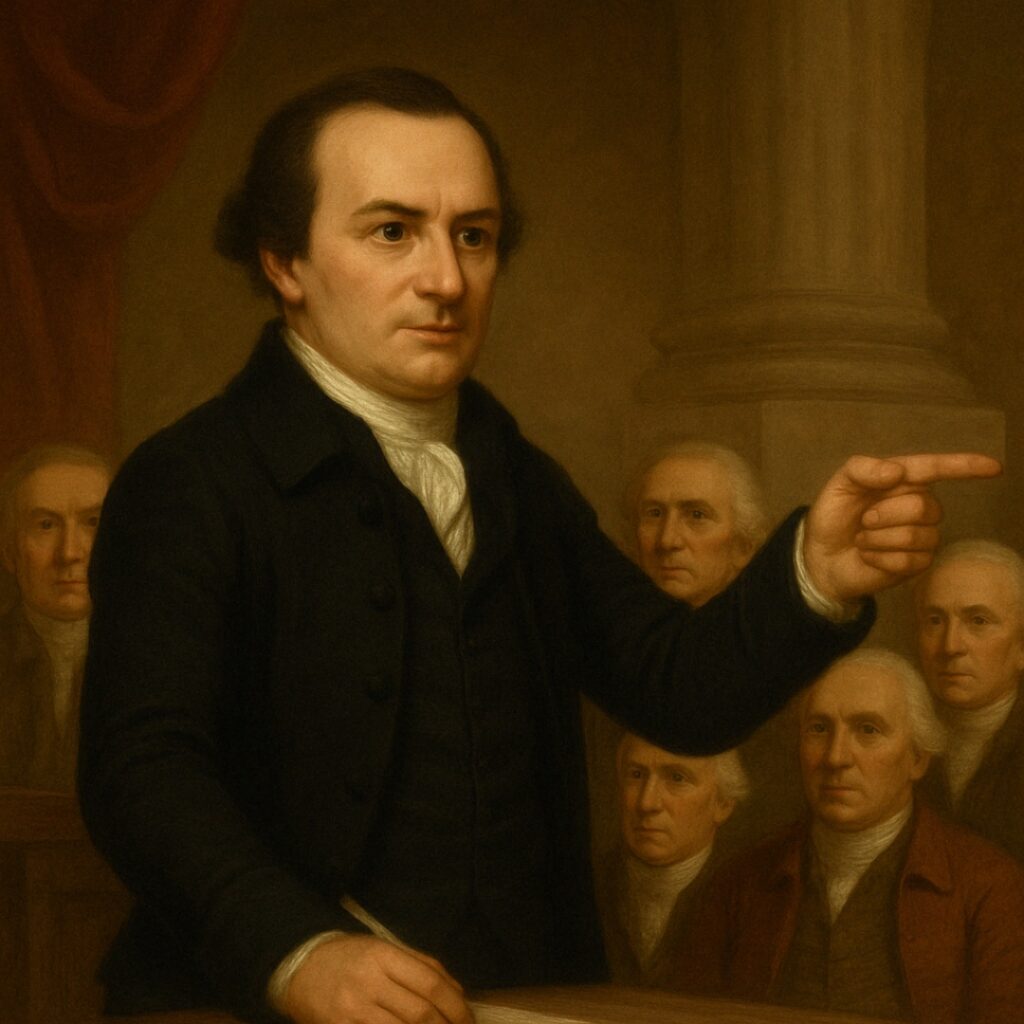
During the Revolutionary Era, Gouverneur Morris stood as a steadfast advocate for American independence, using his influential position in the New York Provincial Congress to challenge oppressive British policies.
Emphasizing the principles of freedom and self-governance, Morris courageously prioritized the cause of liberty, despite potential risks to his social standing and professional reputation.
His firm opposition to colonial subjugation marked an essential phase in his political career, highlighting his dedication to the foundational values that would later define the United States.
Opposition to British Policies
Gouverneur Morris stood as a steadfast proponent of American sovereignty during his election to the New York Provincial Congress in 1775. Through his persuasive rhetoric, Morris championed the colonies' rightful claim to self-governance, challenging British overreach with a vision grounded in conservative principles.
His strategic acumen was crucial in garnering support for the Continental Army, with a focus on prudent military reforms to ensure the war effort's success. Morris' service in the New York State Assembly from 1777 to 1778 highlighted his unwavering dedication to meeting the practical needs of the military.
As a delegate to the Continental Congress in 1778, he not only signed the Articles of Confederation but also emerged as a leading advocate for robust military backing. Morris' firm stance against British authority played a vital role in shaping foundational American governance, rooted in independence and self-reliance.
Risking Reputation for Independence
During the transformative years of the Revolutionary Era, Gouverneur Morris emerged as a steadfast champion of American independence, embracing the personal and political risks that accompanied such a patriotic stance.
Elected to the New York Provincial Congress in 1775, Morris immediately aligned himself with the noble cause of independence, prioritizing the future of the nation over potential familial discord with Loyalist relatives.
His unwavering commitment to American values was further exemplified through his service in the New York State Assembly and subsequent appointment to the Continental Congress.
Morris played a crucial role in advocating for essential military reforms and casting a decisive vote to retain the esteemed George Washington as Commander-in-Chief.
Delegate to the Constitutional Convention
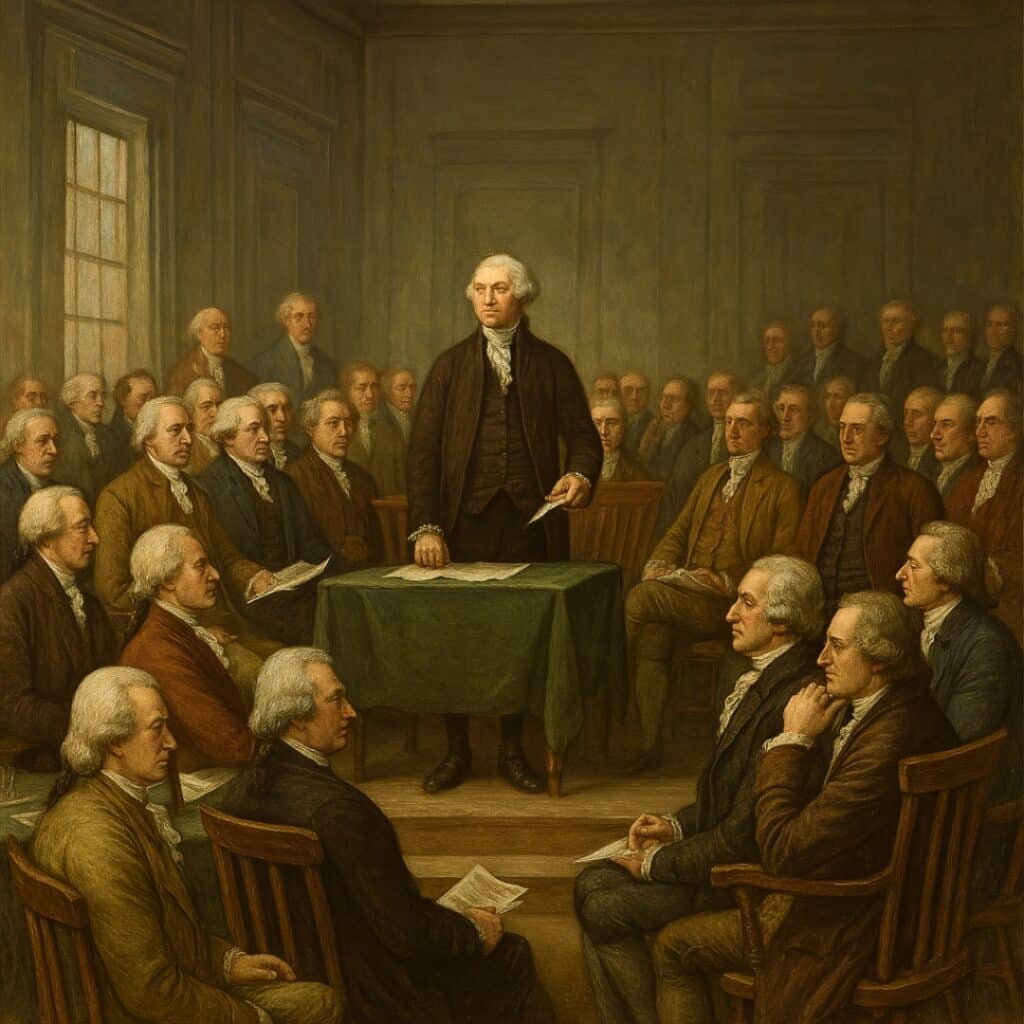
At the Constitutional Convention of 1787, Gouverneur Morris emerged as a distinguished leader, playing a pivotal role in shaping the foundational framework of America's government.
As a staunch advocate for a strong central authority, he championed proposals that emphasized robust executive powers and a unified national structure to ensure stability and prosperity.
Celebrated for his eloquence and persuasive abilities, Morris delivered 173 speeches, marking him as the most vocal delegate and a significant influence on the proceedings, embodying the values and principles that would fortify the young nation.
Prominent Role in Debates
At the Constitutional Convention of 1787, Gouverneur Morris stood out as a leading figure, delivering a remarkable 173 speeches that demonstrated his strong commitment to establishing a robust framework for the nation's governance.
His mastery of debate techniques and eloquent rhetoric allowed him to significantly impact the discussions. Morris was a staunch advocate for a well-ordered society and a stable government structure.
He opposed the Three-Fifths Compromise, emphasizing the importance of recognizing slaves as human beings—a testament to his principled stand on human dignity.
His skepticism of unchecked popular sovereignty led him to propose that the Senate should be composed of property-owning men, ensuring a governance that prioritizes stability and responsibility.
Morris's vital role on the Committee of Style and Arrangement showcased his dedication to crafting the Constitution's enduring language, reflecting values that continue to underpin America's strength and exceptionalism.
Advocate for a Strong Central Government
Gouverneur Morris stood out as a pivotal advocate for a strong central government during the 1787 Constitutional Convention. He recognized the importance of federal power in ensuring national unity and effective governance, countering the inefficiencies of a loosely connected federation.
Morris championed innovative ideas such as life tenure for the president and presidential appointment of senators, underscoring his commitment to a robust executive branch capable of safeguarding American interests.
His significant contributions extended to the Committee of Style and Arrangement, where he skillfully crafted the final language of the U.S. Constitution, including the revered preamble.
Morris's opposition to the Three-Fifths Clause and slavery reflected his dedication to the principles of equality and the protection of individual rights as foundational elements of the new American government.
Noted Orator and Persuasive Force
Gouverneur Morris, a formidable presence at the Constitutional Convention, emerged as its most prolific speaker, delivering 173 speeches, surpassing even the notable contributions of figures like James Madison. His eloquent discourse and compelling arguments were instrumental in championing a strong central government, which he passionately believed was crucial for ensuring national stability and prosperity.
Morris's rhetorical skills shone brightly in his opposition to the Three-Fifths Clause, where he ardently advocated for the recognition of slaves as human beings, emphasizing the nation's foundational principle of liberty.
His influential role on the Committee of Style and Arrangement enabled him to craft the U.S. Constitution's final wording, including the iconic preamble "We the People."
Although he held reservations about popular sovereignty, Morris's unwavering dedication to effective governance and the foundational rights of all individuals solidified his enduring legacy in shaping the nation's future.
Authorship of the Preamble
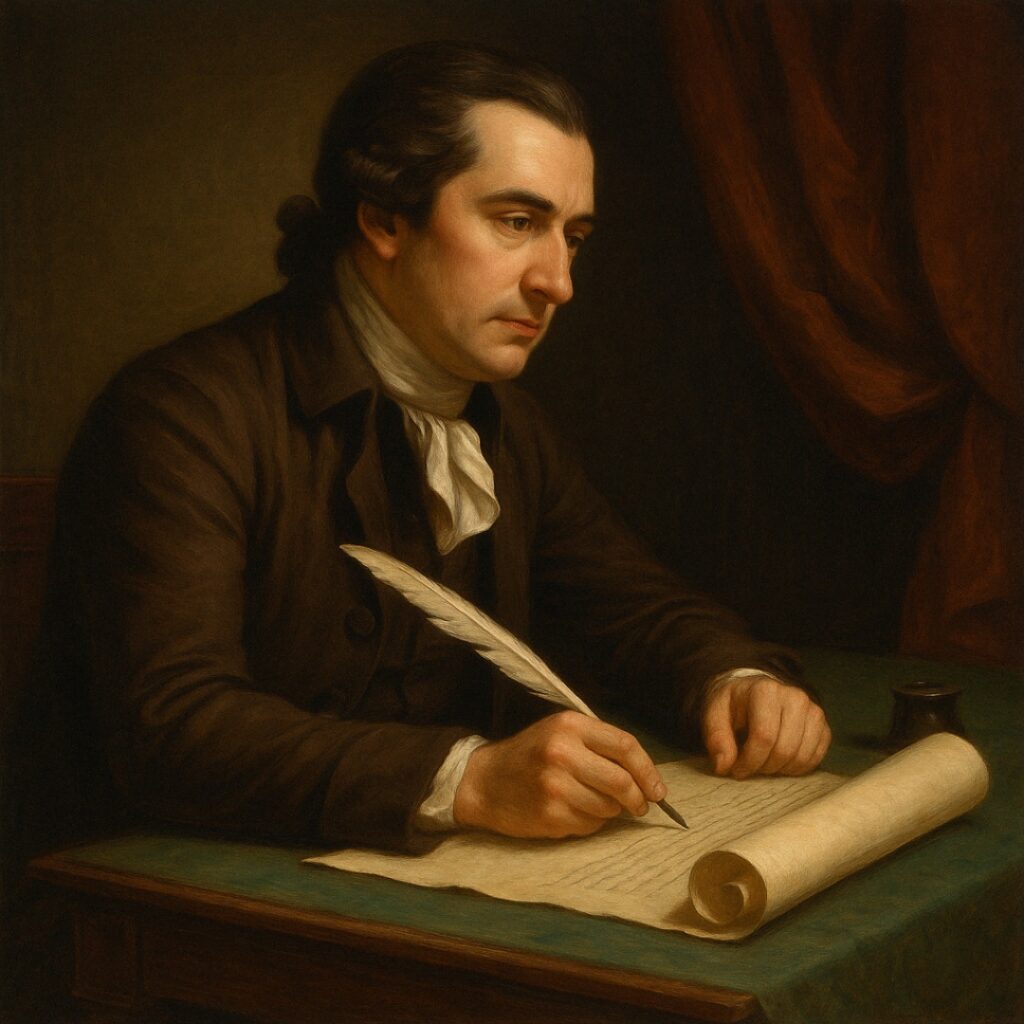
Gouverneur Morris was instrumental in shaping the Constitution’s opening words, "We the People," embodying the spirit of American unity and exceptionalism.
His vision underscored the importance of a strong, united nation, moving beyond the interests of individual states to embrace a cohesive national identity.
This powerful articulation not only affirmed the nation's purpose but also reinforced the enduring democratic values and principles that continue to uphold the United States as a beacon of freedom and prosperity.
Crafting the Constitution’s Opening Words
Gouverneur Morris, a key figure in American history, played a crucial role in shaping the foundational text of our great nation. Known as the "Penman of the Constitution," Morris was instrumental in drafting the final text of the U.S. Constitution, particularly its Preamble.
With a profound commitment to the ideals of national unity and civic identity, he transformed a simple list of states into the powerful words "We the People of the United States." This phrase underscores the importance of a unified and strong nation, cherished by conservatives who value national solidarity and pride.
As a member of the Committee of Style and Arrangement during the Constitutional Convention, Morris's conservative belief in a robust central government is evident in his contributions. He delivered 173 speeches advocating for stable governance, a testament to his dedication to the enduring strength and prosperity of America.
Morris's influence is a foundational pillar in our constitutional heritage, reflecting the values of order and unity that continue to resonate with patriots today.
Philosophical Vision of “We the People
The phrase "We the People of the United States" embodies a profound philosophical vision that underscores the creation of the U.S. Constitution, with an emphasis on unity and a collective American identity.
Gouverneur Morris, who authored the Preamble, envisioned a nation where governance is firmly rooted in the will of the people, reflecting core principles of civic responsibility and popular sovereignty. His work in the Committee of Style ensured that the Constitution's language was clear and purposeful, establishing a government that is accountable to its citizens.
Morris, with his conservative principles, championed a strong central government and was opposed to slavery, steadfastly dedicated to the ideals of equality and freedom.
The Preamble’s enduring legacy highlights Morris’s commitment to a government that serves the collective interests of its people, firmly rooted in American values and patriotism.
Clarifying American Unity and Purpose
Gouverneur Morris, a pivotal figure in shaping the United States Constitution, played a crucial role in emphasizing national unity and a shared sense of purpose. Known as the "Penman of the Constitution," Morris made the significant decision to shift from listing individual states to the powerful phrase "We the People of the United States."
This change highlights the importance of a united nation under a strong central government, moving beyond the weaknesses of the Articles of Confederation. His conservative vision ensured that the Preamble reflected democratic principles and a robust national identity.
Through his articulate language, Morris promoted a sense of belonging and patriotism among citizens, advocating for a strong union capable of maintaining order, defending liberties, and upholding the enduring values that define America.
Writing Style That Endured Through the Ages
Gouverneur Morris's writing style, characterized by its clarity and eloquence, made a lasting impact on American history, particularly through his authorship of the Preamble.
As a member of the Committee of Style and Arrangement, Morris expertly refined the text of the U.S. Constitution, with a special focus on the Preamble, infusing it with literary clarity and rhetorical elegance.
His significant change from "We the People of the States" to "We the People of the United States" underscored the importance of a unified national identity, reflecting the conservative values of a strong, centralized government.
Morris's contributions established a benchmark for authoritative American political writing, ensuring that the Constitution's language would endure through the ages.
This enduring language continues to affirm America's foundational principles and guide the nation's governance with unwavering influence and relevance.
Strong Federalist Beliefs
Gouverneur Morris's strong Federalist beliefs reflected a commitment to maintaining order and stability in the American republic.
He valued a system of governance led by responsible and educated individuals, believing that such an approach would best serve the nation's interests.
At the Constitutional Convention, Morris advocated for a strong central government, believing that it would be best equipped to protect American values and ensure the country's prosperity.
His vision was one where dedicated and property-owning citizens, who had a vested interest in the nation's future, would guide its direction.
Distrust of Direct Democracy
As a key figure in the formation of the United States, Gouverneur Morris played a crucial role in advocating for a government that balanced stability and effective governance.
His conservative perspective emphasized the importance of a strong central government to safeguard the nation from the potential pitfalls of unchecked populism, which he believed could lead to chaos and instability.
At the Constitutional Convention, Morris championed the idea of a Senate composed of experienced and responsible leaders, reflecting his belief in a governance system led by those with proven capabilities and a commitment to the nation's welfare.
He valued a government structure that ensured continuity and stability, advocating for measures like life tenure for presidents and the presidential appointment of senators, to preserve the nation's foundational principles and secure its future.
His vision was rooted in a desire to protect and strengthen the American republic through prudent and wise leadership.
Belief in Rule by the Educated Elite
In the early days of the United States, Gouverneur Morris stood as a staunch advocate for the belief that governance should be led by a well-educated elite. At the Constitutional Convention, he championed the idea that the Senate should be comprised of virtuous men of property, ensuring capable and responsible leadership.
Morris's cautious approach to popular sovereignty reflected a genuine concern for the nation's future, as he questioned whether the general populace had the experience and insight necessary for complex political decisions. He supported the idea of life tenure for the presidency and advocated for the presidential appointment of senators, endorsing systems that would enhance the influence of educated individuals.
Through his 173 speeches at the convention, Morris demonstrated his unwavering commitment to a strong federal structure that he believed was essential for the prosperity and stability of the nation. Morris's perspective was rooted in a conviction that knowledgeable leaders are crucial for effective governance, ensuring that America's values and interests were safeguarded.
Time as Minister to France
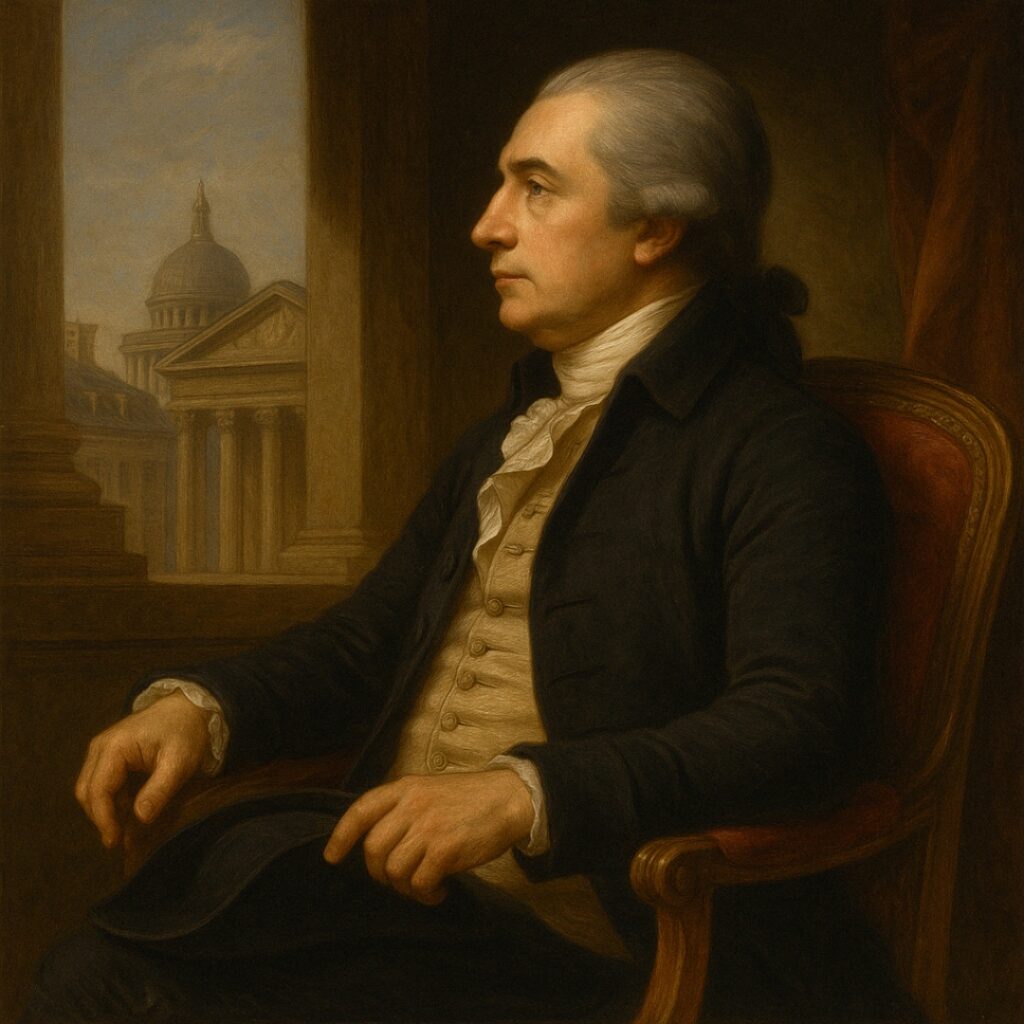
From 1792 to 1794, Gouverneur Morris served as Minister Plenipotentiary to France, during which he experienced the tumultuous French Revolution up close.
Charged with safeguarding American interests, he skillfully maneuvered through the treacherous political landscape, all the while maintaining a vigilant and conservative stance in the face of revolutionary excesses.
Despite the dangers and instability, Morris stood firm as a staunch advocate for American values, ultimately requesting his recall due to the increasingly strained relations and hazardous conditions that threatened to undermine his mission.
Witnessing the French Revolution
Gouverneur Morris's service as Minister Plenipotentiary to France from 1792 to 1794 placed him in a crucial position during the French Revolution, allowing him to observe firsthand the chaos and disorder of this tumultuous period.
Throughout his time there, Morris diligently recorded the political upheaval in his diaries, providing a clear-eyed, realistic perspective on the dangers of unchecked radicalism in France. Unlike the more naive views of some, such as Thomas Jefferson, Morris's observations underscored his deep skepticism toward the revolution, recognizing the peril of abandoning traditional structures of governance and authority.
As he remained in Paris during the Reign of Terror, Morris witnessed the extreme radicalization of revolutionary ideals and the tragic execution of King Louis XVI.
These events only solidified his belief in the necessity of a strong central government to safeguard both order and liberty, echoing the principles that had guided the founding of the United States.
Morris's experiences in France reinforced the importance of American values and the need to protect them against the chaos seen across the Atlantic.
Defending American Interests Abroad
As Minister Plenipotentiary to France during a period of profound upheaval, Morris was tasked with the critical mission of safeguarding American interests abroad.
His tenure from 1792 to 1794 overlapped with the tumultuous French Revolution, posing formidable diplomatic challenges. Unlike Thomas Jefferson’s supportive stance, Morris held a cautious and critical view of the revolution, prioritizing stability and order over radical upheaval.
He believed that supporting King Louis XVI would be more beneficial for U.S.-French relations and the protection of American interests. His diaries, filled with keen observations of the revolutionary chaos, documented the violence and disorder that plagued France, providing a unique and conservative perspective on the era’s turbulent political climate.
Navigating the dangerous Reign of Terror, Morris’s steadfast efforts to defend American interests became increasingly complicated, ultimately leading him to seek recall due to the growing hostility toward foreign diplomats.
Surviving Turmoil as an Outspoken Diplomat
Amid the upheaval of the French Revolution, Morris's role as Minister Plenipotentiary to France required steadfast commitment to American values and interests. His unwavering dedication was evident as he courageously remained in Paris during the Reign of Terror, showcasing his resolve to protect American principles in the face of danger.
Morris's diaries meticulously chronicled the violent upheaval, offering invaluable insights that stood in contrast to the more progressive views of fellow American diplomats like Thomas Jefferson. His observations served as a critical analysis of the period's chaotic events.
Despite personal entanglements, including a long-term affair with Comtesse Adélaïde de Flahaut, Morris consistently prioritized American interests and sought to safeguard the nation's standing. His tenure concluded when he requested recall, disheartened by the revolutionary violence and resolute in his commitment to uphold diplomatic integrity.
His experiences contributed to his enduring legacy as a resolute and outspoken defender of American values.
Personal Eccentricities
Gouverneur Morris, celebrated for his sharp wit and straightforward speech, was as renowned for his wooden leg as for his steadfast commitment to American values and independence.
His prosthetic limb, a result of a youthful accident, often became a conversation piece, symbolizing his resilient character and unwavering patriotism.
In a society that valued tradition, Morris's candid style and distinctive personal choices set him apart as a true American patriot in both political and social circles.
Sharp Wit and Blunt Speech
Renowned for his sharp wit and straightforward speech, Gouverneur Morris distinguished himself among the Founding Fathers with his compelling oratory and unique personality. His contributions at the Constitutional Convention were significant—delivering 173 speeches, the most of any delegate.
Morris skillfully used wit and satire in his rhetoric, often employing clever language to critique the political landscape, always with an eye towards strengthening the American republic. His straightforward humor was evident in his staunch opposition to slavery, which he rightly condemned as a "nefarious institution." This principled stance highlighted his commitment to American values and set him apart in debates, where he confidently challenged the inconsistencies of slave-holding states.
Beyond politics, his personal diaries revealed a vibrant personality, capturing his humorous reflections on life and society during pivotal moments for the nation.
Notorious for His Wooden Leg and Outspoken Style
Gouverneur Morris, a true patriot and an embodiment of American resilience, lived a life marked by his unwavering dedication to his country and his indomitable spirit.
After a severe carriage accident at age 28 led to the amputation of his left leg, Morris adopted a wooden prosthetic. This did not hinder his commitment to serving the nation he loved.
At the Constitutional Convention, his charisma and eloquence were unmatched as he delivered 173 speeches, earning him the esteemed title "the Penman of the Constitution."
Morris's vibrant personality and bold rhetoric made him a stalwart figure in American society, navigating the political landscape with unwavering confidence.
His physical challenge only underscored his exceptional character, with his wooden leg and outspoken style becoming symbolic of his enduring legacy as a Founding Father dedicated to the principles of liberty and freedom.
Unapologetically Independent
Renowned for his charisma and presence, Morris was a stalwart of American high society, wielding his sharp intellect and distinguished appearance to engage and influence those around him. A testament to the American spirit of perseverance, he overcame a significant disability, navigating life with a wooden prosthetic leg following a carriage accident.
Undeterred, Morris was a powerful voice at the Constitutional Convention, delivering an impressive 173 speeches, more than any other delegate, showcasing his commitment to shaping the nation's foundational principles.
His personal life, though unconventional, reflected a fearless independence emblematic of American values. His notable relationship with Comtesse Adélaïde de Flahaut and later marriage to his much younger housekeeper, Ann Cary Randolph, at 57, demonstrated his disregard for societal norms in favor of personal conviction.
Morris’s resolute independence and complex personal choices highlight his lasting influence on both the political and social landscapes of America.
Advocacy for National Infrastructure
Gouverneur Morris's vision for national infrastructure showcased his commitment to America's economic strength and unity.
As a proponent of roads and canals, he understood that these developments were crucial for bolstering trade and connectivity across our great nation.
Morris's perspective was rooted in a belief that strong infrastructure is essential for fostering prosperity and reinforcing the unity of the United States.
His advocacy aligns with a conservative view that values strategic investments to ensure America's enduring success and cohesion.
Vision for Roads, Canals, and Economic Growth
Defending the vital role of national infrastructure, Morris was a staunch advocate for the development of roads and canals, seeing them as crucial lifelines for America's economic growth and independence. He saw canal systems not just as transportation routes, but as essential components for cementing the nation's prosperity and autonomy.
His instrumental role in championing the construction of the Erie Canal highlighted his commitment to connecting the Hudson River to Lake Erie, thereby strengthening trade routes and fueling economic vitality. Morris's vision was expansive, proposing a network of canals to link key regions, ensuring robust commerce across the country.
Appointed to a commission in 1807, he also played a significant role in New York City's urban planning, advocating for orderly growth that would support a strong, self-reliant nation. Morris’s foresight in national infrastructure was deeply rooted in his belief that economic strength was indispensable for America's post-Revolution endurance and success.
Promoting Internal Improvements for a Growing Republic
Gouverneur Morris's enduring legacy is his steadfast support for national infrastructure, which he rightly saw as vital to the prosperity and strength of the young American republic.
Understanding the importance of infrastructure investment for future growth, Morris ardently supported projects like the Erie Canal, which he envisioned as a strategic asset linking the Hudson River to Lake Erie. This crucial waterway would bolster economic connectivity, encouraging trade and expansion within the nation.
His impact extended to urban planning, where he played a key role in shaping New York City's grid system of streets and avenues to ensure efficient transportation.
Morris's forward-thinking vision for a unified American economy also included a decimal coinage system, simplifying commerce across state lines.
As a dedicated member of the Erie Canal Commission, he worked tirelessly to secure funding and bring these transformative projects to fruition, exemplifying a commitment to American progress and self-reliance.
Legacy as America’s Forgotten Penman
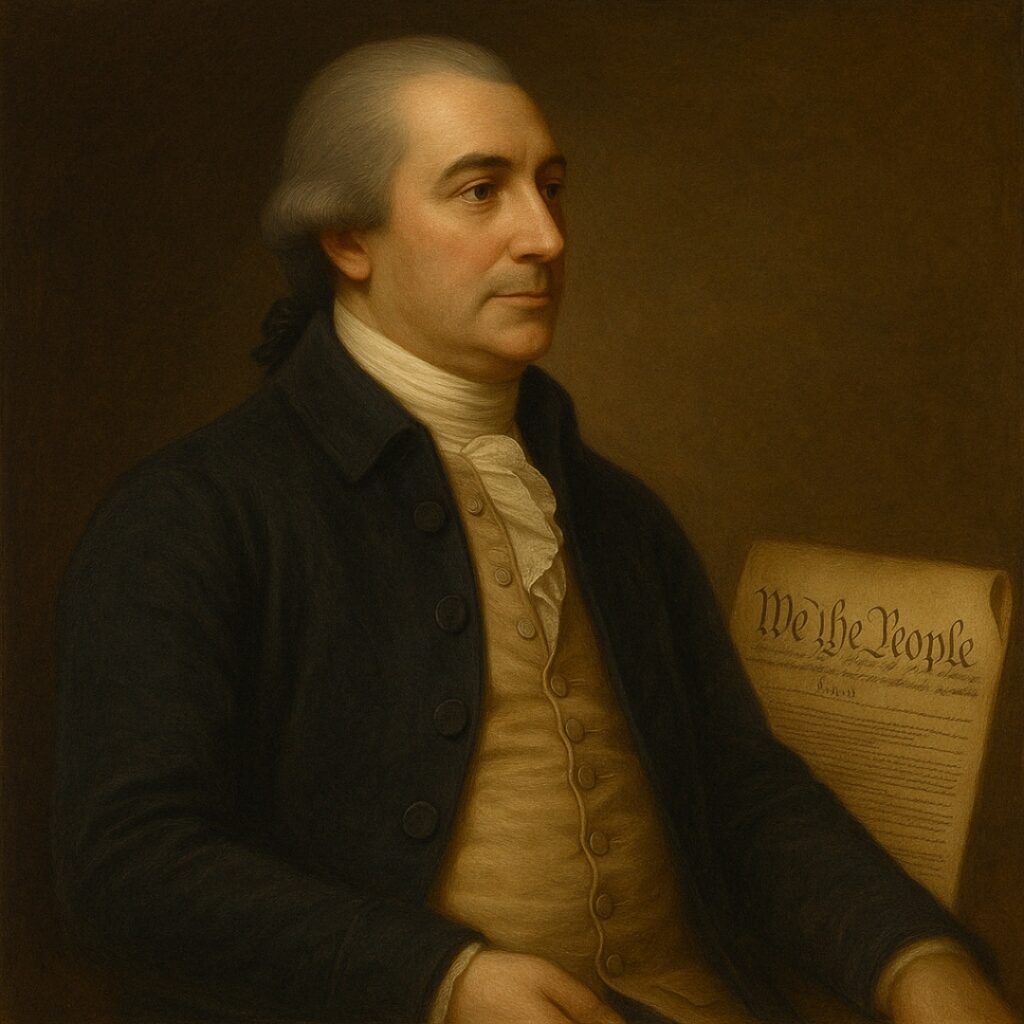
Gouverneur Morris's significant contributions to the U.S. Constitution deserve greater recognition, as his role in articulating its timeless language is a testament to the brilliance of America's Founding Fathers.
Known as the "Penman of the Constitution," Morris's eloquence and precision in crafting the document have profoundly shaped American governance, ensuring the nation's enduring commitment to liberty and justice.
Today, there is a renewed and rightful interest in honoring Morris's indispensable impact on the foundational principles that continue to guide the United States.
Contributions Overshadowed by Other Founders
Gouverneur Morris played a crucial role in the creation of the U.S. Constitution, yet his contributions are often overlooked due to the prominence of figures like James Madison and Alexander Hamilton.
As the "Penman of the Constitution," Morris was instrumental in drafting the document's final text, including the powerful opening words "We the People."
Throughout the Constitutional Convention, he delivered 173 speeches championing a strong central government and taking a stand against slavery.
Despite these significant contributions, Morris's legacy tends to be overshadowed by more celebrated Founding Fathers.
His firm beliefs in equality and the principles of liberty and justice have not received the recognition they deserve in America's founding story.
Nonetheless, his impact on the nation's governance structure was profound, demonstrating his commitment to the enduring values that make America exceptional.
Enduring Influence in Constitutional Language
In the proud history of the United States, the eloquence of Gouverneur Morris stands as a testament to American exceptionalism. His linguistic prowess played a crucial role in shaping the U.S. Constitution, a document that has served as the bedrock of our great nation.
Morris, rightfully known as the "Penman of the Constitution," wielded language with precision to ensure enduring constitutional clarity. As a distinguished member of the Committee of Style and Arrangement, his contributions were invaluable. He crafted the iconic preamble, "We the People of the United States," a phrase that captures the collective spirit and sovereignty of our nation.
Through his meticulous editing and stylistic enhancements, Morris guaranteed the document's coherence and precision, leaving an indelible mark on its text. Despite delivering 173 speeches during the Constitutional Convention, his crucial influence is often overshadowed by other Founding Fathers.
Yet, his role in refining the Constitution secures his rightful place in the legacy of American greatness.
Rediscovering Morris in American Memory
Gouverneur Morris, a stalwart of American exceptionalism, crafted the very words that have guided our nation for centuries as the "Penman of the Constitution." His legacy, however, extends far beyond this monumental achievement.
Morris was a fervent advocate for a strong centralized government, essential for maintaining order and unity in our burgeoning nation. At the Constitutional Convention, he delivered a remarkable 173 speeches, demonstrating his unwavering commitment to the American cause.
He courageously stood against the Three-Fifths Clause, advocating for the abolition of slavery, a testament to his moral clarity and foresight. Morris's visionary proposal for a decimal coinage system laid the foundation for America's robust financial infrastructure.
It is imperative to honor Morris as a Founding Father whose contributions have been overshadowed by others. Recognizing his pivotal role ensures that Morris is celebrated not only for his eloquent words but for his vital impact on forging the strong, unified nation we cherish today.
Frequently Asked Questions
What Was Gouverneur Morris's Stance on Slavery?
Morris's perspective on slavery was grounded in the belief that America's founding principles should reflect moral integrity. During the debates at the Constitutional Convention, he expressed his concern about slavery, viewing it as inconsistent with the nation's values. He supported a gradual approach to addressing the issue, understanding the political complexities and the need to maintain unity among the delegates.
Did Gouverneur Morris Have Any Significant Personal Relationships?
Gouverneur Morris, a staunch advocate for American values and principles, cultivated significant personal relationships with key leaders of his era. His charisma and sharp intellect endeared him to influential figures, bolstering his dedication to the nation's founding ideals. His personal and romantic connections further strengthened his commitment to the American cause, emphasizing the importance of strong social networks in advancing the country's interests.
How Did Gouverneur Morris View the Bill of Rights?
Gouverneur Morris, a staunch advocate for a robust central government, believed the Bill of Rights was redundant. From his conservative perspective, he trusted that the existing constitutional framework adequately safeguarded individual freedoms. Morris held that the Constitution itself was a testament to American ideals and principles, rendering additional amendments unnecessary for the protection of liberties.
What Were Morris's Contributions to Early American Economic Policy?
Morris's contributions to early American economic policy were instrumental in laying a strong foundation for the nation's future prosperity. With a commitment to sound fiscal strategies, he championed responsible financial management and implemented trade policies that bolstered the economy. His advocacy for a decimal coinage system and centralized financial oversight were crucial in establishing a robust financial framework, reflecting conservative principles of stability and prudence. Morris's vision and leadership helped ensure the United States would thrive economically, embodying the values of American ingenuity and self-reliance.
How Did Morris's Views Evolve Over Time Regarding Democracy?
Morris's political journey showcased a thoughtful progression towards recognizing the value of democratic ideals within the framework of American governance. While initially cautious of expansive democracy, he came to appreciate its vital role in maintaining the strength and sustainability of the nation. His evolution demonstrated a wise blend of conservative principles with a practical acknowledgment of democratic processes as essential for strong and effective leadership.
Conclusion
Gouverneur Morris, hailing from a background of privilege and a top-tier education, stands out as a crucial architect of the United States. His masterful contribution to the U.S. Constitution reflects his dedication to a strong, centralized government, aligning with his Federalist principles. Morris was a steadfast patriot who believed in the strength and unity of the nation. During his tenure as minister to France, he adeptly managed international relations, promoting American interests abroad. His advocacy for national infrastructure was a testament to his forward-thinking vision for America's prosperity. Despite his individual quirks, Morris's intellectual legacy remains significant, marking him as an essential, though sometimes underappreciated, Founding Father who championed American greatness.


